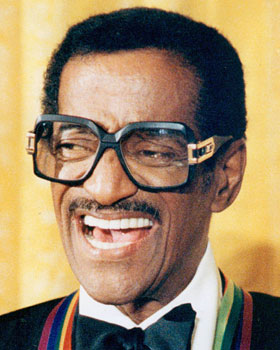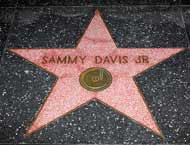Sammy Davis Jr.
Sammy Davis Jr. was a
quintessential showman who was embraced by his peers as "Mr.
Entertainment" for his enormous talent and versatility.
His career began to take shape when, after World War II, Davis re-formed a trio with his father and adopted uncle, Will Mastin. But they led a hand-to-mouth existence as vaudeville died and they tried breaking into nightclubs Davis continued to increase his repertoire — adding trumpet, drums, celebrity impressions — as the trio crisscrossed the country, taking whatever dates they could find. The trio appeared with headliners such as Mickey Rooney, Frank Sinatra and Bob Hope. Jack Benny later intervened to get them a booking at Ciro's nightclub in Hollywood, where they opened for singer Janis Paige. The audience would not let them off — or Paige on — stage. The next night, Paige was the opening act for the Will Mastin Trio. By 1954, when Davis released his first album under contract to Decca Records, his father and Mastin had become background accompaniment to his soaring performances. With Davis as its centerpiece, the trio sold out clubs from Los Angeles to New York, and the group was in constant demand for guest spots on television variety shows. He then became a member of Hollywood's so-called "Rat Pack" and made six of his 23 movies with them, beginning with "Ocean's Eleven" in 1960 and ending with "One More Time" in 1970. Davis became a fixture in the firmament of American stars. Before his "Rat Pack" movies, he had appeared in "The Benny Goodman Story," costarred with Eartha Kitt in "Anna Lucasta" and won rave notices as Sportin' Life in the film version of "Porgy and Bess." His friends' affection for the man who enjoyed describing himself as a "little one-eyed colored guy" was nowhere more evident than during a television tribute commemorating his more than six decades in show business. Said singer Whitney Houston, a guest on the televised tribute taped the year before Davis' death at age 64: "He helped to break down the color barriers. I think he fought the battle for the rest of us." Davis would have been the first to acknowledge that he was but one soldier among generations of troops who assaulted color barriers. Nonetheless, he determinedly fought his battles with whatever weapons were available, including one that he felt the haters could not withstand—his talent.
|
Putting my experiences of Life In NYC in a more personal perspective, and checking in with international/national, tech and some other news
Translation from English
Sunday, December 8, 2013
Born today- Sammy Davis Jr.
Subscribe to:
Post Comments (Atom)


No comments:
Post a Comment
Please leave a comment-- or suggestions, particularly of topics and places you'd like to see covered